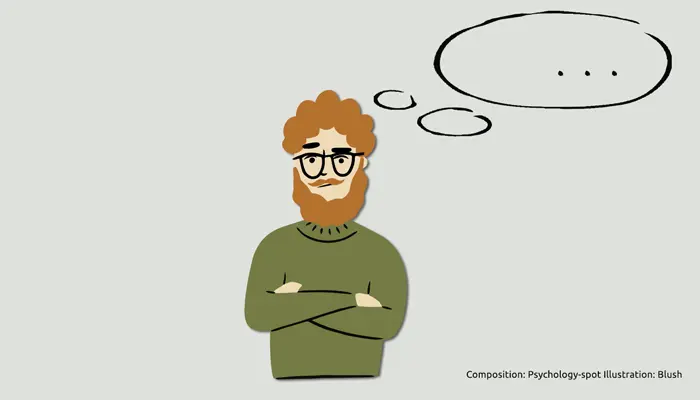
Our mind looks for connections and patterns. It is a normal trend. We do it automatically to find meaning in what happens, draw conclusions and act accordingly.
However, on many occasions the desire to find explanations leads us to establish spurious links between cause and effect. Sometimes the desire for things to acquire meaning to escape uncertainty makes us fall into the post hoc fallacy.
Post hoc ergo propter hoc, the sophistry that leads us to establish erroneous links
The phrase post hoc ergo propter hoc is a Latin expression used to express sophistry: “after this; therefore, because of this.” Shortened to post hoc, it is also known as coincidental correlation.
This fallacy consists of connecting two unrelated events, assuming that one has caused the other. What generates the error is the temporal sequence. Since one event occurs after another, we assume that the second is a consequence of the first.
Since our thinking is fundamentally linear, we often give too much importance to the time factor in the equation, without realizing that it is just another variable. As a result, we jump to conclusions based solely on the order in which events occur.
Basically, the post hoc fallacy consists of thinking:
Event A occurred before event B.
Therefore, A caused B.
Obviously, temporal coincidence is not enough to establish cause and effect links between two events. For example, roosters always crow before the sun rises. If we apply post hoc ergo propter hoc reasoning, this would lead us to think that the sun rises when the rooster crows. Obviously, we know that is not the case.
However, in real life causal relationships are not so obvious, so we continually fall into the post hoc fallacy. In fact, this sophistry lies at the basis of many superstitious beliefs, magical thinking, and even our social prejudices.
From good luck to malaria, the different paths of post hoc reasoning
Imagine that you are walking and you find a lucky clover. Later that day, you pass an exam with flying colors or pass a job interview and are chosen for the position. You might think that clover brought you good luck. However, you would be a victim of the post hoc fallacy since one event really has no connection to the other.
In fact, many people who believe in good or bad luck make this type of error by connecting events that have no logical or causal link. Lucky charms are an example of post hoc fallacy because we think they will help us improve our performance or achieve our goals.
In reality, all a lucky charm can do is give us an extra dose of confidence through suggestion. The rest will depend on our capabilities, effort and preparation, as well as the circumstances.
Not even scientific thought is immune to this fallacy. History proves it. When malaria spread, some doctors of the time observed that people who were exposed to the most night air, especially in summer, were more likely to develop the disease.
Post hoc reasoning implied that night air was the cause of malaria. In fact, its name comes from the Italian term “mal’aria” which means “bad air.” It took a long time to understand that it was Anopheles mosquitoes that transmitted the disease. Although these were more common in summer and, of course, attacked more people who spent more time outdoors, that did not mean that the air had any harmful component per se.
Why does the post hoc fallacy occur?
The post hoc fallacy takes advantage of our natural desire for simple explanations. We have a hard time dealing with uncertainty, especially in modern times, when we have become accustomed to instant answers and solutions.
Furthermore, our brains are programmed to find patterns, search for factual certainties, and make snap judgments. We love mental shortcuts, a phenomenon that in Psychology is known as “heuristics” and that, although they can give us some confidence, in addition to helping us make quick decisions, often these shortcuts can lead us astray, making us connect points that are not related.
Another underlying factor that fuels the post hoc fallacy is our confirmation bias. Added to our obsession with looking for patterns is the tendency to fundamentally interpret and remember information that confirms our pre-existing beliefs. Therefore, if we believe in luck, we will be tempted to use amulets and attribute to them magical power over events.
In the same way, if we are jealous, we will believe that an omission by our partner is a sign of infidelity. And if we have the seeds of xenophobia within us, we will blame any worsening of social conditions on the arrival of greater numbers of foreigners.
The worst thing about post hoc ergo propter hoc reasoning is that we are often so convinced of its truth that we make decisions based on these spurious correlations. Obviously, this makes us make mistakes and becomes fertile ground for stereotypes, prejudices and extreme judgments with little rational basis to grow.
How to free ourselves from the post hoc fallacy?
To detect a post hoc fallacy we must begin by developing a dose of healthy skepticism. Although our brain tends to establish correlations between events, we must remember that many phenomena can occur coincidentally, without this meaning that they are related or that one has caused the other.
A temporal correlation does not imply causation. To demonstrate a cause/effect relationship we need much more evidence than a simple temporal progression. Whenever we hear a statement of this type – or make it ourselves – we must ask or look for reliable evidence and arguments that support it beyond the temporal connection.
We must also remember that practically all phenomena are multidetermined, which means that no matter how tempting it may be to simplify their causes and make quick generalizations, it is most likely that different factors come together at their origin, many of which we do not even know.
Being aware of the multidimensionality of phenomena and learning to move in that complex world, feeling relatively comfortable with uncertainty, will reduce our need to establish spurious correlations that only give us illusory security and distance us from a more logical and adaptive comprehension of the world around us and the things that happen.
References:
Redelmeier, D. A. & Ross, L. D. (2020) Pitfalls from Psychology Science that Worsen with Practice. J Gen Intern Med.; 35(10): 3050–3052.
Hempelmann, E. & Krafts, K. (2013) Bad air, amulets and mosquitoes: 2,000 years of changing perspectives on malaria. Malar J.; 12: 232.
Pope, K. S., & Vasquez, M. J. T. (2005) Avoiding logical fallacies in psychology. En: K. S. Pope & M. J. T. Vasquez, How to survive and thrive as a therapist: Information, ideas, and resources for psychologists in practice (pp. 101–107).



